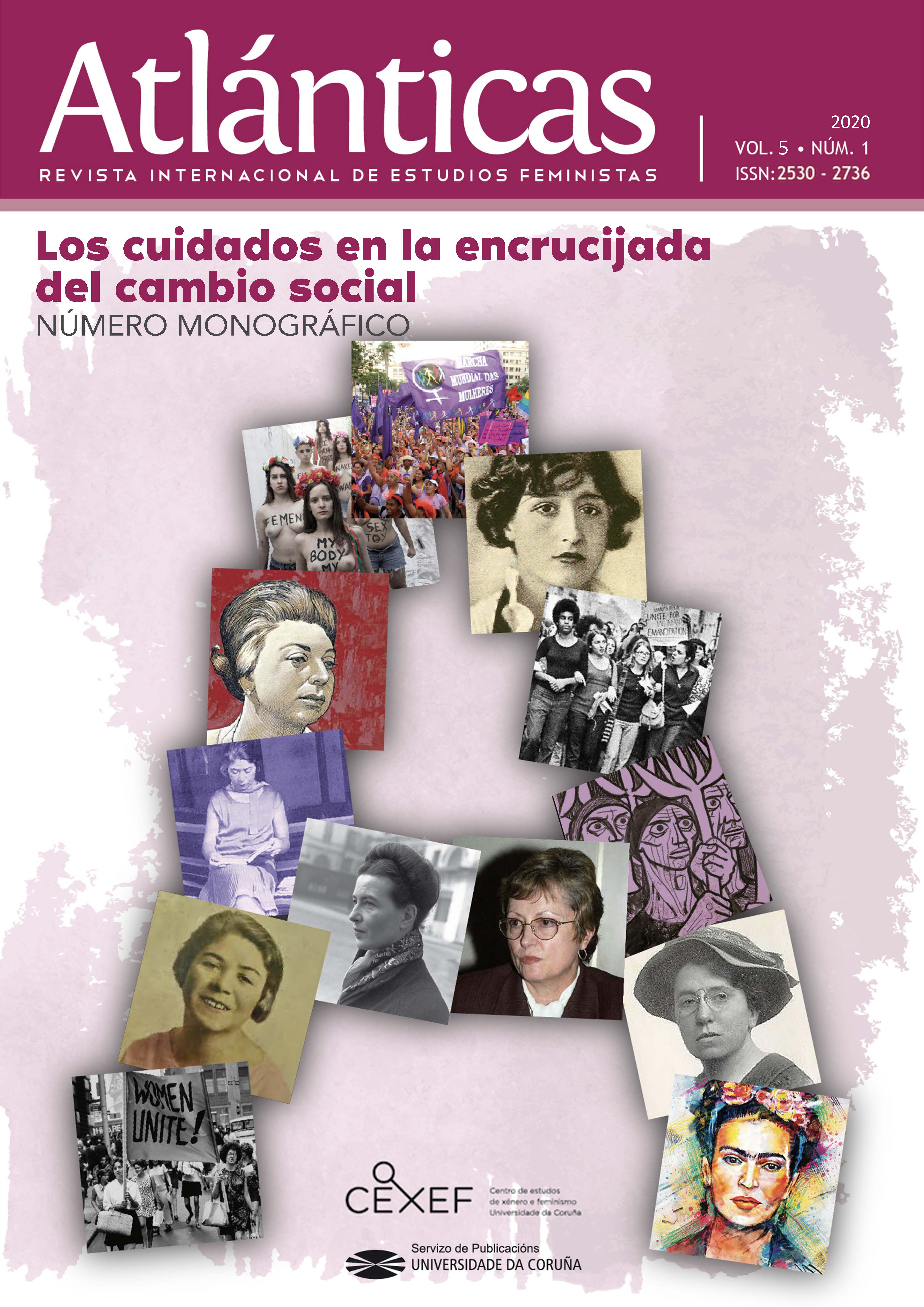Fractal care geometry: potential of technologies for quality care policies in domestic sphere
Main Article Content
Abstract
Keywords:
Downloads
Article Details
References
Agrela, B., Martín Palomo, M. T., Langa, D. (2010). Modelos de provisión de cuidados: género, familias y migraciones. Nuevos retos y configuraciones. Alternativas. Cuadernos de Trabajo Social, 17, 9-17. doi: https://doi.org/10.14198/ALTERN2010.17.1
Barrett, C.b. y Swallow, B.M. (2006). Fractal poverty traps. World Development, 34 (1), 1-15.
Buse, C., Martin, D., y Nettleton, S. (2018). Conceptualising 'materialities of care': making visible mundane material culture in health and social care contexts. Sociology of Health & Illness, 40 82, 243-255. doi: https://doi.org/10.1111/1467-9566.12663
Carrasco, C.; Borderías, C.; Torns, T. (eds.). (2011). El trabajo de cuidados: historia, teoría y políticas. Madrid: Los libros de la Catarata.
Chettiparamb, A. (2014). Complexity theory and planning: Examining ‘fractals’ for organising policy domains in planning practice. Planning Theory, 13 (1), 5-25. doi: https://doi.org/10.1177/1473095212469868
Daly, M. y Lewis, J. (2000). The Concept of Social Care and the Analysis of Contemporary Welfare States. British Journal of Sociology, 1, 281-298. doi: https://doi.org/10.1111/j.1468-4446.2000.00281.x
Durán, M. A. (2018). La riqueza invisible del cuidado. Valencia, España: Universidad de Valencia.
Fernández Cordón, J. A. y Tobío, C. (2007): Andalucía. Dependencia y solidaridad en las redes familiares. Sevilla, España: IEA.
Fisher, B., y Tronto, J.C. (1990). Toward a feminist theory of caring. En E. Abel & M. Nelson (eds.), Circles of Care: Work and Identity in Women’s Lives. Albany, USA: State University of New York.
Gómez Bueno, C. (2000). Del etiquetado de las ocupaciones según nivel de cualificación. Revista de Sociología del Trabajo, 39, 33-61.
Gómez Bueno, C. y Bretin, H. (2011). Sexualidad y envejecimiento. Sevilla, España: Junta de Andalucía.
Gómez Bueno, C. y Martín Palomo, H. (2020). Tecno-cuidados en los hogares. Cualificaciones requeridas, activadas y activables en el Servicio de Ayuda a Domicilio. Cuaderno de Relaciones Laborales, 38, 2, 231-250. doi: https://doi.org/10.5209/crla.70881
Haraway, D. (1988). Situated Knowledges: The Sciences Question in Feminism and the Privilege of Partial Perspective. Feminist Studies, 14 (3), 575-599. doi: https://doi.org/10.2307/3178066
Harding, S. (1986). The Science Question in Feminism. Ithaca, N.Y., Cornell University Press.
Harding, S. (1992). After the Neutrality Ideal: Science, Politics, and «Strong Objectivity». Social Research, 59 (3), 567 587.
Ibáñez, J. (1991). El regreso del sujeto. La investigación social de segundo orden, Santiago de Chile, Chile: Amerinda.
Ley 39/2006, de 14 de diciembre, de Promoción de la Autonomía Personal y Atención a las personas en situación de dependencia. BOE, 299, de 15/12/2006.
Latimer, J., López Gómez, D. (2019). Intimate Entanglements: affects, more-than-human intimacies and the politics of relations in science and technology. The Sociological Review Monographs, 67(2), 247-263. doi: https://doi.org/10.1177/0038026119831623
Latour, B. (2002). Morality and technology: the end of the means. Theory, Culture & Society, 19, 247-260. doi: https://doi.org/10.1177/026327602761899246
Lyon, D. y Gluksmann, M. (2008). Comparative Configurations of Care Work across Europe. Sociology, 42, 1, 101-118. doi: https://doi.org/10.1177/0038038507084827
Mandelbrot, B. (2009). La geometría fractal de la naturaleza. Barcelona, España: Tusquets.
Martin, A., Myers, N. y Viseu, A. (2015). The politics of care in technoscience. Social Studies of Science, 54 (5), 625-641. doi: https://doi.org/10.1177/0306312715602073
Martín Palomo, M.T. (2016). Cuidado, vulnerabilidad e interdependencias. Nuevos retos políticos. Madrid, España: CEPC.
Martín Palomo, M.T. (2008). «Domesticar» el trabajo: una reflexión a partir de los cuidados. Cuadernos de Relaciones Laborales, 26 (2), 13-44.
Martín Palomo, M.T. y Muñoz Terrón, J. M. (2014). Epistemología, metodología y métodos. ¿Qué herramientas para qué feminismo? Reflexiones a partir del estudio del cuidado. Quaderns de Psicología, 16(1), 35-44. doi: https://doi.org/10.5565/rev/qpsicologia.1213
Martín Palomo, M.T., y Gómez Bueno, C. (2018). Resultados Estudio Cualitativo. Portal Familiar GESAD. Informe de Investigación. Granada: Universidad de Granada (inédito).
Martínez-Buján, R. (2014). Regional Models of Social Organization of in-home Care for the Elderly. Revista Española de Investigaciones Sociológicas, 145, 99-124. doi: http://dx.doi.org/10.5477/cis/reis.145.99
Mol, A., I. Moser y J. Pols (eds.), (2010). Care in practice. On Tinkering in Clinics, Homes and Farms. Bielefeld, Alemania: transcript Verlag.
Molinier, P. (2013). Le travail du care. Paris: La Découverte.
Muniesa, F. (2019). Société du comportement, information de la sociologie. Zilsel, 5(1), 196-207. doi: https://doi.org/10.3917/zil.005.0196
Moré, P. (2017). Cuidados a personas mayores en las grandes ciudades: género, clase social y etnicidad. Madrid, España: CIS.
Nakano Glenn, E. (2000). Creating a caring society. Contemporary Sociology, 29, 1, 84-94. doi: https://doi.org/10.2307/2654934
Paperman, P. (2004). Perspectives féministes sur la Justice. L’année Sociologique, 54, 2, 413-434. doi : https://doi.org/10.3917/anso.042.0413
Puig de la Bellacasa, N. (2012). ‘Nothing comes without its world’: thinking with care. The Sociological Review, 60 (2), 197-216, doi: https://doi.org/10.1111/j.1467-954X.2012.02070.x
Razavi, S. (2007). The Political and Social Economy of Care in a Development Context. Conceptual Issues, Research Questions and Policy Options, Gender and Development, Programme Paper Number 3. Switzweland: UNRISD.
SAAD. 2018. Online: http://www.dependencia.imserso.es/InterPresent1/groups/imserso/documents/binario/im_061364.pdf [Date consulted: 13.01.2018]
Tegmark, M. (2018). Vida 3.0. qué significa ser humano en la era de la inteligencia artificial. Barcelona, España: Taurus.
Tobío, C., Agulló Tomás, M.S., Gómez, M.V., y Martín Palomo, M.T (2010). El cuidado de las personas. Un reto para el siglo XXI. Barcelona, España: Fundación La Caixa.
Tronto, J. (2013). Caring Democracy. Markets, Equality, and Justice. New York: USA: NYU Press.
Tronto, J. (1993). Moral Bounderies. A Political Argument for an Ethic of Care. London, Inglaterra: Routledge.
Zambrano, I.; Martín Palomo, M. T.; Muñoz Terrón, J. M. y Olid, E. (2015). Nuevos interrogantes en el modelo de provisión de cuidado en Andalucía. Zerbitzuan, 60, 113-130. doi: http://dx.doi.org/10.5569/1134-7147.60.08
Zhukov, D. y Lyamin, S. K. (2016). The Modeling of Institutional Modernization by Means of Fractal Geometry. SAGE Open. Doi: https://doi.org/10.1177/2158244016640858


